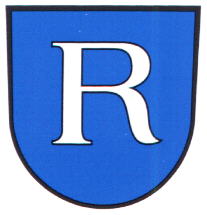Ritschweier: Difference between revisions
Knorrepoes (talk | contribs) No edit summary |
Knorrepoes (talk | contribs) m (Text replace - "[[Literature" to "{{media}} [[Literature") |
||
| Line 21: | Line 21: | ||
The arms remained unchanged until 1972. The seal of the village, however, showed between 1945 and 1960 a completely different shield. The shield was divided and showed in the upper half three wheat-ears and in the lower divided half, left two apples and right a plough. These were clearly agricultural symbols. The arms were never used anywhere else and no colours are known. | The arms remained unchanged until 1972. The seal of the village, however, showed between 1945 and 1960 a completely different shield. The shield was divided and showed in the upper half three wheat-ears and in the lower divided half, left two apples and right a plough. These were clearly agricultural symbols. The arms were never used anywhere else and no colours are known. | ||
{{media}} | |||
[[Literature]] : John and Wüst, 1996 | [[Literature]] : John and Wüst, 1996 | ||
Revision as of 04:27, 9 July 2014
| Heraldry of the World Civic heraldry of Germany - Deutsche Wappen (Gemeindewappen/Kreiswappen) |
RITSCHWEIER
State : Baden-Württemberg
District (Kreis) : Rhein-Neckar Kreis (until 1973 Mannheim)
Incorporated into : 1972 Weinheim
Official blazon
In Blau der silberne lateinische Großbuchstabe R.
Origin/meaning
Ritschweier was a separate village belonging to the Counts of Erbach for many centuries. From 1812-1837 it was part of the municipality of Rippenweier.
The village had already in the 17th century a separate village-seal. It showed the letter R, the initial of the village and was made in 1673. The same letter appears in the new seal from 1837. The letter was placed in a shield, and colours were added in 1910, when the arms were officially granted. The colours are derived from the colours of the arms of the Wittelsbach family, Counts of the Pfalz (see Bayern).
The arms remained unchanged until 1972. The seal of the village, however, showed between 1945 and 1960 a completely different shield. The shield was divided and showed in the upper half three wheat-ears and in the lower divided half, left two apples and right a plough. These were clearly agricultural symbols. The arms were never used anywhere else and no colours are known.
Contact and Support
Partners:
Your logo here ?
Contact us
© since 1995, Heraldry of the World, Ralf Hartemink 
Index of the site
Literature : John and Wüst, 1996











